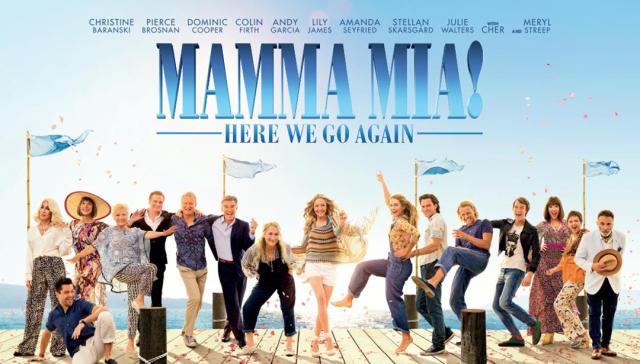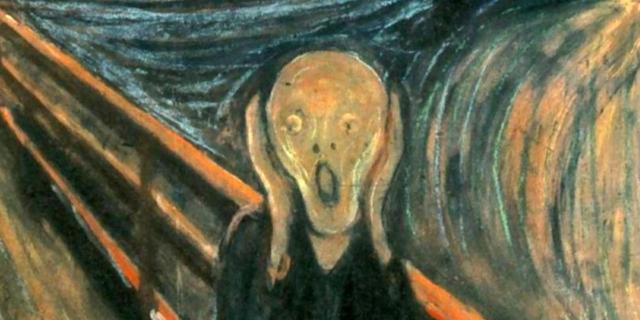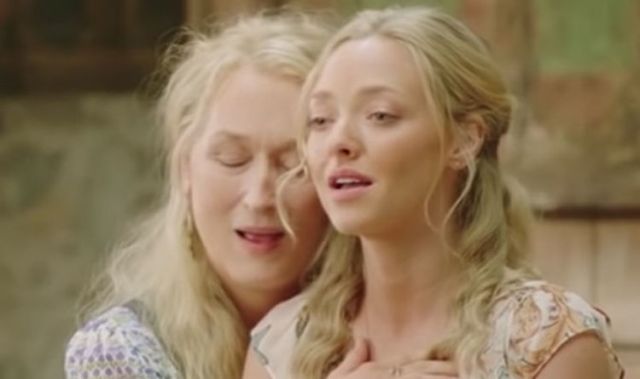
When the first trailers for “Mamma Mia – Here We Go Again” arrived, the absence of Meryl Streep was conspicuous. As were certain lines that hinted at her character Donna Sheridan’s absence in the “Mamma Mia” movie sequel. Her likely permanent absence. I was concerned. Surely they didn’t… (spoilers to follow from here on…)
Meryl Streep was listed as a cast member on IMDb, so her presence in “Mamma Mia – Her We Go Again” seemed assured, but by the time the (mostly enthusiastic) reviews for the return of the ABBA movie musical hit the internet, the death of Meryl Streep’s character Donna Sheridan a year before the present day events in the movie was confirmed.
My reaction might be summarized thusly:

They killed off Meryl?! OK, not Meryl, but they killed off Donna? The heart and soul of the first “Mamma Mia”? They give the character a happy end in the first movie, only to wrest it all brutally away within four years of story or so, dead and mourned by all in the new movie?
Isn’t this all supposed to be happy escapist fun? I really was counting on that! Goofy, happy, tuneful fun! Why let the death of the most beloved character hang sorrowfully over the escapist proceedings? How is that supposed to work without souring the whole soufflé?
Surprisingly enough, for the most part it works just fine, even for me who admittedly maybe cares a little too much; and even though I still would have preferred explaining away the absence of Streep from 95% of the movie with way-laid travels or perhaps a full on coma from which Donna could return/awaken just in time for the finale and then resume her happily ever after (no less plausible than much else in these films’ plots).
Nonetheless, cheery/wistful Abbaesque shenanigans ensue enjoyably throughout. Grief over Donna is treated lightly, both sincerely and comically, casting not a pall but mostly merely a light melancholy over the film. I guess in these darker times, even the most unabashedly escapist bauble must take on a wistful patina.
Which by the final song becomes an undeniable tearjerker. Streep finally appears in the flesh – that may not be the best phrase, since technically at that point she is appearing as a ghost or memory – singing “My Love, My Life” with her daughter, who is baptizing her own daughter. At which point I have to concede through my gushing tears that Donna’s demise gives this mother/daughter duet sequel a gut-punching power that travel delays or even a coma comeback just wouldn’t have mustered. The original “Mamma Mia” didn’t open such floodgates. (And I am certainly not alone in responding that way. The BBC radio 5 Live movie critic Mark Kermode, already on record declaring “My Love, My Life” his favorite ABBA song, confessed not just to tears but to loud sobbing in the screening room. You go, Mark, and “Hello to Jason Isaacs!”)
“My Love, My Life”, beautifully sung by Meryl Streep and Amanda Seyfried (and Lily James as the young Donna on the opening verse), is the undeniable musical and dramatic highlight of the movie. And by that I mean no disrespect to the whole entertaining cast, new and returned. Heck, just Cher singing “Fernando” with Andy Garcia is a glorious gift from the Movie Music Gods!
My Love, My Life – ABBA
My Love, My Life – Amanda Seyfried, Meryl Streep, Lily James

But there is one more musical gem from Streep via “Mamma Mia – Here We Go Again”, one even better than her singing “My Love My Life”. And no, I don’t mean the reprise of “Super Trouper” during the credit encores.
It’s Meryl Streep singing one of ABBA’s more unusual songs, “The Day Before You Came”. Don’t look for it in the movie, not even the end credits. It turns up as a bonus track on the “Mamma Mia – Here We Go Again” soundtrack album.
In “The Day Before You Came” the singer recounts the mundane, much-like-any-other day she got through “before you came”. The tone lies somewhere between disinterest and ennui, as the attempt is made to meticulously remember this nothing special of a day, in three long verses of numerous lengthy phrases that only get longer and longer until the concluding clause “the day before you came”. What exactly happens the presumably fateful day “you” come, or who “you” is, all that is left to the imagination, only in the instrumental sections is greater passion, greater yearning, hinted at. Some might find this song tries their patience; I think it’s brilliant. It’s not just one of the more unusual ABBA songs, but surely one of the more singular songs in mainstream pop.
ABBA’s original uses a cool electronic pop arrangement to accompany the singer’s daily grind, with a soaring wordless vocal during the instrumental section the only hint of warmth and passion. For Streep’s version, a piano is the main accompaniment, with an orchestra sparingly but very effectively used for support and the swelling instrumental obligato. For the most part this rendition sounds like an intimate performance in a cabaret, and Streep imbues the lyrics with much storytelling nuance.
A sign of the times can be found in two small lyric changes between the original and Streep’s version. In the original, the singer mentions reading a book by “Marilyn French, or something in that style”, as well as having watched every episode of “Dallas” on TV. Marilyn French wrote “The Women’s Room” a feminist touchstone novel of the late 1970’s. It’s kind of cool Benny and Björn chose that author of all authors for Agnetha to sing about.
(Do people still remember Marilyn French? I remember seeing “The Women’s Room” on my mother nightstand. Now I imagine Elaine Stritch quoting her famously withering aside about hats during the “The Ladies Who Lunch” as “Does anyone … still read … Marilyn French?”)
In the new version Marilyn French and “Dallas” have been replaced. Meryl Streep sings about reading Margaret Atwood, whose “The Handmaid’s Tale” nowadays has taken on greater feminist urgency than ever before in the novel’s 33 year history. And the TV show mentioned now is “House of Cards”, of all shows, the long running series of White House malfeasance. Could those references be any more purposefully nodding towards the current socio-political climate? I wonder how instrumental Streep was in making these particular lyrical updates.
The Day Before You Came – ABBA
The Day Before You Came – Meryl Streep


Hey Danny- I enjoyed your blog about Meryl Streep in MM2. I agree with you that her version of The Day Before You Came is wonderful, and that its reference to House of Cards might be a deliberate little reference by Meryl to the current political climate in America. But…did you know that the Marilyn French reference in the ABBA original was actually a big clue as to the song’s real meaning? The latest one by Marilyn French at that time (1982) was about two strangers who meet on a train, have an instant attraction to eachother and embark on an ill-fated relationship? The story does not have a happy ending for Agnetha. Bjorn and Benny have now admitted as much, and they were trying to use the mournful, haunting music to hint at this!
LikeLiked by 1 person
If one really wants to take a very deep dive into possible interpretations of the song, check out its lengthy wikipedia page: https://en.wikipedia.org/wiki/The_Day_Before_You_Came (it includes the above in detail too, without however referencing Björn and Benny’s confirmation). I personally like how much the song leaves open to interpretation and the listener’s imagination, regardless of what specifically likely inspired the writers.
LikeLike